Pirates of the XX century
 In the 1990s, the software market in the newly formed Russia was actively developing, but somewhat one-sided: the main part of the programs on the PC were foreign programs with removed (or initially absent) copy protection; Often, the same domestic craftsmen translated the program into Russian (sometimes overwriting the original copyrights), dealt with copy protection, and eventually sold the program at the price of the carrier and without any support. It was different from the modern varez scene, half-underground and entirely virtual: Russian vendors of other people's software did not hide at all, on the contrary, they advertised in magazines, produced completely physical diskettes and (later) CDs, and in the computer stores they had entire shelves . It is clear that domestic software development in such an environment was not very viable: the already mentioned Lexicon - a program of quite decent quality that the newly formed Russian businessmen tried to put on commercial rails - was bought “legally” well if one user from a hundred.
In the 1990s, the software market in the newly formed Russia was actively developing, but somewhat one-sided: the main part of the programs on the PC were foreign programs with removed (or initially absent) copy protection; Often, the same domestic craftsmen translated the program into Russian (sometimes overwriting the original copyrights), dealt with copy protection, and eventually sold the program at the price of the carrier and without any support. It was different from the modern varez scene, half-underground and entirely virtual: Russian vendors of other people's software did not hide at all, on the contrary, they advertised in magazines, produced completely physical diskettes and (later) CDs, and in the computer stores they had entire shelves . It is clear that domestic software development in such an environment was not very viable: the already mentioned Lexicon - a program of quite decent quality that the newly formed Russian businessmen tried to put on commercial rails - was bought “legally” well if one user from a hundred.(When I first entered mathematics, our professor warned us: " Do not even expect that in Russia you will be able to earn a living by programming. Of the domestic software companies, the profit is only 1C, and that only because the regulatory documents change every year , and the stolen version of the software becomes useless after a year. Probably, it is such a government policy to support programmers to change accounting requirements each year. ")
Therefore, it is natural that the magazines of the 1990s actively discuss the current unfavorable situation for programmers, and suggest ways to influence it. All agree that the dominance of piracy is a feature of the transitional period, caused by a temporary lack of interest of Western right holders to the Russian market; and that in a few years the software market in Russia will develop into a similar European one. But now, fifteen years later, the average person’s attitude to software copyright has changed little. This means that some recommendations of that time remain relevant to this day.
')
Last time I promised to publish an article by Olga Uskova , now the owner of so many awards and honorary titles, that they managed to fill an entire article on Wikipedia:

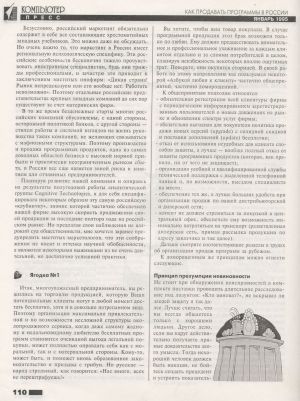
(ComputerPress, January 1995)
The proposed article will raise the topic of software marketing in Russia, Vice-President of the company Cognitive Technologies OA Uskova.
How to sell software in Russia,
or Berries of the commercial director
A year and a half ago in Russia there was a perception that the program is such a thing that scientists eccentrics or naive foreign companies provide to resourceful Russian users for free. Having a licensed copy was considered as embarrassing as buying a ticket on public transport or complying with the rules of the road. A discussion of the psychological aspects of this problem would have had to start from the time of Ivan the Terrible ...
It is even more surprising that in such a short period (one and a half years - nothing compared to the time that commodity-money relations existed in Russia), a fantastic shift occurred in the minds of our compatriots. A stratum of intelligent users appeared, who finally realized that “stealing is more expensive”, “the miser pays twice,” and so on.
The international policy of firms - suppliers of software products is aimed at maximum benefits to honest users. The “pass to paradise” here is undoubtedly the user registration procedure. For example, on the registration card of our product CuneiForm for Windows, the user reads that after registration he can, in particular. Buy the following copies of the product at a 25% discount, receive an upgrade at a 70% discount, buy other products of our company at reduced prices, receive a free update for 2 months, use the hot-line for free and receive our mailing list. If promises are not kept, the firm must be legally responsible to its customers.
The concept of "software market" includes many serious moments: the organization of advertising, sales, customer support, and the like. It is about this, and not about the exciting successes of Microsoft and Lotus, you should think first. Wonderful stories about moneyless start and instant take-off to millions of sales made life difficult for domestic entrepreneurs with a desire for quick success, because they put the hard work of manufacturers and sellers of programs to shape the market for their products in the shadows.
Often, excellent authoring works (especially for complex programs with serious scientific content) simply do not reach their customers. The excellent workings of Russian scientists in the field of speech synthesis, gaming, training and presentation programs literally disappear, works on automated workplaces are abandoned, and large data management systems that could become Klondike for energetic entrepreneurs have not been transferred from the EU computer. Why?
Of course, the term "production" in Russia in recent years has become synonymous with "hopeless enterprise", for the production of anything it was impossible to get a loan in any Russian bank. Indeed, the cost of renting space in Moscow far surpassed the European. And the cost of the advertising company is approaching world standards, although it is lagging behind in quality. But the potential market in Russia is huge. The activity of the business part of the population is rapidly gaining momentum. So the question is not whether it is possible to sell programs in Russia, but how to do it.
Of course, Russian marketing necessarily contains all the components of the textbook Western textbooks. It can not even be discussed. But it is very important that marketing in Russia has a regional psychological specificity. These Russian peculiarities are endlessly hard for foreign specialists to feel, be they three times professionals, and often this leads to the conclusions of venerable foreign companies: “Wild country! The market is unpredictable or not at all. It is impossible to work. ” Therefore, individual Russian representative offices of large Western companies still exist at the expense of the parent companies.
At the same time, the cashless starts of many Russian companies are due, on the one hand, to the cautious policy of banks, and on the other hand, to the style of work and system of views on the life of the management of such companies that do not want to get involved with mafia structures. Therefore, the production and sale of software products, one of the most profitable areas of business with a high rate of return and an almost unlimited sales market, in Russia is still a risk zone and occupation for desperate entrepreneurs.
Planning the development of our company and relying on the results of the semi-annual work of the analytical group Cognitive Technologies, I have specified for myself this Russian “strawberry” in some way, the knowledge of which partially provided our company with a high rate of promotion of its products over the past year and a half on the Russian market. But by offering my observations to the broad public court, I would like to warn venerable marketers in advance that these considerations do not carry a hint of scientific generalization, but are some poems from a not very long, but rather successful practice.
Berry number 1
So, dear entrepreneur, you have decided to trade in products that your potential customers can get for free at any time, although in a rather battered form. Therefore, the organization of the most attractive and, if possible, uncomplicated structure of the near-sales service, when even the most greedy and short-sighted lover of free programs becomes aware of the benefits of a legal purchase, can fully justify itself both from the moral and material side. Someone, perhaps, will help the newly formed legislation and appeals from the stands. But the Russians are a shooting people, as they say: “There are many of us, you can’t pereprafuet all!”
You want your product to buy. In the case of software products, this marriage is possible only for love. It should be preceded by attentive and professional care for each client individually and behind the layers of consumers in general, planning the inevitability of some quite tangible spending. Believe me, they will pay off handsomely. In our work in this area, we use some “ABC of love for the client”, partially accepted, partially homegrown.
Common approaches include:
- compulsory registration of the entire clientele of the company with periodically informing registered users about new movements in the market and updating the range of services of the company;
- necessarily profitable for the buyer policy of selling new versions (upgrades) with a substantial discount and the supply of add-ons (update) for free;
- avoiding the use of inconvenient for the client protection methods, or better - generally a complete failure to protect software products (which, as a rule, does not protect against anything);
- organization of a convenient and qualified technical support service with a dedicated telephone line and, if possible, a specialist visit to the site:
- providing the same, and better than big comforts, when organizing sales through your distribution and dealer network;
- the customer should not strive to purchase at the central office, provide him with the opportunity to spend minimal money on transport (an extensive dealer network, direct delivery of products to the customer's address, and so on).
Next, see the relevant sections in the works on the organization of sales programs abroad.
The following principles can be attributed to the homegrown principles.
The principle of presumption of innocence
It is not worth when a failure is found in the delivery set to conduct a long investigation under the slogan: "Who is to blame?", Whether the villain did not reveal the defense and so on. It is better to assume that you always communicate only with good people. Another thing, if you suddenly really get direct evidence of malicious intent. Then the bad person should be punished, do not be afraid to create a precedent and arrange a demonstration process. But in no case do not spread suspicion to the rest of humanity.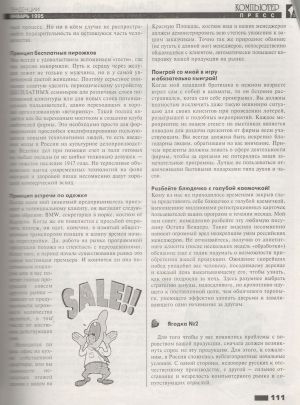
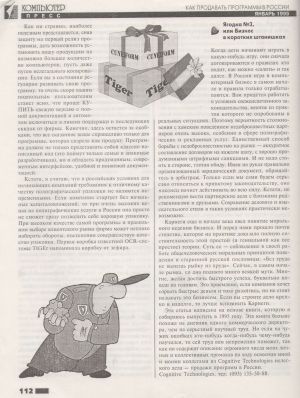
The principle of free pies
We always remember with pleasure the “guests” where we were fed deliciously. The path to the heart through the stomach is not only the man, but also the most keen woman diet. Therefore, I advise you to give serious attention to the periodic arrangement of FREE seminars for various layers of potential clientele or for new layers of potential users who have long been moving into a well-organized “party”. This approach is like a transitional bridge to the creation of a club of company lovers. This is simply necessary for the formation of a layer of people who are skilled in using new technologies, that is, the introduction of fashion in Russia for cultural workflow. Doing business with an account and crowds ready for any salary (and not very intelligent) girls is a heavy legacy of 1917. But patient explanations of the benefits of modern technology against the background of tasty and healthy food will undoubtedly give a good commercial shoot.Principle of meeting on clothes
When an acquaintance of mine comes to a potential client, he looks like this: BMW, secretary in a mink, a suit from Cardin. When he appears with a request to postpone payment, he is dressed, of course, in a raincoat wrinkled by public transport and a hat from the time of the beginning of perestroika. Yes, the work on the software market is similar to a disguised play, moreover, in the period when the market began to exist, this is a real premiere. And whether it will end in a full house or whether rotten products from a completely different market will fly into you - depends on the well-thought of a huge number of small things, including the costumes of the characters.Whether your office is located in the kitchen of your own apartment, or if you occupy several floors of a building overlooking Red Square, your suit and your managers should demonstrate all the respect for your customers. In the same way, the natural charm (not to be confused with the length of the legs) of managers who directly communicate with the client automatically increases the quotation of your products on the market.
Come play with me and win!
When my younger brother, at a tender age, played chess with himself, he was extremely upset when he lost to himself. You must completely exclude even such an innocent situation for your clients during lotteries, raffles and similar events. Each event at your booth at exhibitions is the reason for the distribution of gifts from the company to all participants. You should always be sincerely grateful to the people who have paid attention to you. And the gifts should lie in the field of the company, so that your wonderful programs are not lost behind the prizes. It is better not to use abstract household gifts such as perfumes and watches.Break the saucer with the blue border!
Who among us did not sometimes have to close his eyes to imagine a saucer with a blue border filled with millions of registration cards of users of your programs during a month. My advice to you: immediately break this favorite vessel of Ostap Bender. Such visions undoubtedly cause great harm to the fragile minds of Russian managers. Do not despair, having received a promise from an appealing customer (after several weeks of “processing”) for another year to think about the possibility of purchasing your products. Waiting for early victories will liken you to a person who planted a tree and dug it up every day to find out how it grew overnight. It is wiser to choose the strategy of a bore, annoying, but painstakingly reaching the goal, than a touchy hurry, who can effectively slam doors and flood one undertaking after another.Berry number 2
In order for you to have problems with the theft of your products, you must first have a demand for these products. For this, unfortunately, in Russia there were unfavorable initial conditions. On the one hand, Russian mistrust of domestic production, on the other - a strong lag and immaturity of the computer market and related industries.
Strangely enough, it seems most useful to remove the protection on the first release of the program, to give the opportunity to install your products on the greatest possible number of computers, even by illegal copying. If you are able to regularly develop your program. then very soon it will become clear to your underground users that it is easier to BUY the latest version with full documentation and the machine into the support line and subsequent discounts from the company. Of course, it remains outside the brackets that all of the above is true only for a program that has matured as a product. The program should not only be a cool written code (only families and familiar developers will understand this), but also have a well-thought-out, modern interface, convenient and understandable documentation.
By the way, I believe that in Russian conditions for start-up companies the requirements for the excellent quality of printing packaging are not indispensable. If a company starts without initial investment, then at very high prices for printing services in Russia, it simply cannot immediately afford a good package. With the high quality of the program itself and the correct choice of the client market, the company can gain momentum well, gradually improving the quality of packaging. The first box of the famous OCR-system TIGEr resembled a marshmallow box.
Berry No. 3, or Business in short pants
When children begin to play any game, they first agree on the rules: who drives, how to “salit” and so on. In Russia, the game of computer business at the very beginning and the rules are only being worked out. You will have to work in the conditions of freshly baked legislation, many of whose items have not been tested in real situations. Therefore, the probability of a collision with the boorish behavior of unscrupulous partners is very high, especially in the field of printing and advertising services. The only way to combat dishonesty in the market is careful drawing up contracts at every turn, with well thought-out penalties. And do not stand aside, swallowing the insult. Having a properly organized legal document in your hands, contact arbitration. Only if we ourselves are serious about the adopted legislation, will it finally begin to operate in its entirety. By the way, I do not recommend partnering with close relatives and friends. Saving business and exacting style in such conditions is almost impossible.
Carnegie at the beginning of the century introduced the concept of moral business. And almost a century passed before us, which in practice proved the complete viability of this simple (and ingenious as all simple) theory. Its essence is the observance in its work of the universal moral principles of behavior and the old Russian proverb: “Without effort, you cannot take the fish out of the pond”. Now, at the very beginning of the market, a lot of dregs have been raised from the bottom. Many, wanting to achieve quick success, literally went over their heads. This is acceptable if the company wants to break fast money and go quietly, but do not call it a business. If you build a business hard and for a long time, it is better to remember Carnegie.
This article is based on a book I’m about to release in 1995. This book is more like a diary of a commercial director than a serious scientific work. But if somebody has ever learned something from someone else's mistakes, then this work will certainly help you, as it contains a description of a huge number of my personal and collective failures in the course of mastering me and my colleagues from Cognitive Technologies, a difficult matter - selling programs in Russia.
Cognitive Technologies, tel: (095) 135-50-88.
It is gratifying that Cognitive Technologies is engaged in software development and today (even blogged on Habré! ), Unlike Mikroinform, with their purely Western marketing approach (the main thing is a smart box! ) And with cheats on Moscow BBS. But, paradoxically, in the same issue of ComputerPress as Uskova’s article, on the full-color tab, the collections “stopitsot other games on one disc” from some Tech Express Software are advertised:
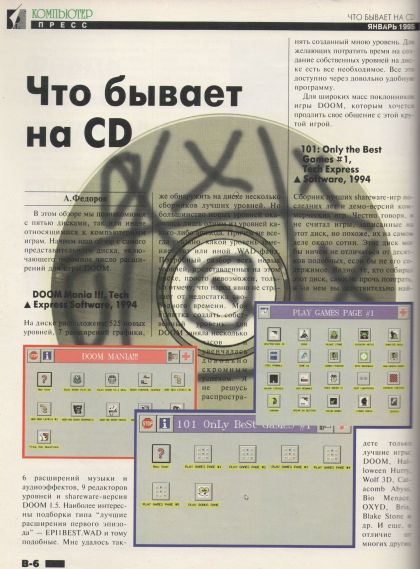
What happens on a CD
A.Fyodorov
In this review, we will get acquainted with five disks, one way or another related to computer games. We begin our review with the most representative disk, including a huge number of extensions for the game DOOM.DOOM Mania !!!, Tech Express Software, 1994
The disk contains 525 new levels, 7 graphics extensions, 6 music and audio effects extensions, 9 level editors and a shareware version of DOOM 1.5. The most interesting are the “best extensions of the first episode” type EPI1BEST.WAD and the like. I also managed to find on the disc several collections of the best levels. But most of the new levels turned out to be only one of the levels of any episode. And it is not always indicated which level replaces this or that .WAD file. A detailed analysis of all the new levels presented on this disc is simply impossible, but I will note that the people obviously do not suffer from a lack of free time. My attempt to create my own level for DOOM took several hours and was crowned with quite modest success. I do not dare to distribute the level created by me. For those who want to spend time creating their own levels on the disk has everything you need. All this is available through a fairly convenient program.For the masses of fans of the game DOOM, who want to extend their communication with this cool game.
101: Only the Best Games # 1, Tech Express Software, 1994
The collection of the best shareware-games of recent years and demo versions of commercial games. Honestly, I did not count the games recorded on this disc, but it looks like there are actually about a hundred of them. This disk could be no different from dozens of similar, if not its contents. It can be seen, those who collected this disc do not mind playing, and on it you will really find only the best games: DOOM, Halloween Hurry, Wolf 3D, atacomb Abyss, Bio Menace, OXYD, Brix, Blake Stone, etc. And, Unlike many other discs, games can run directly from a CD, they have an annotation, and all this is available through a convenient menu. Here is a disc.However, who will surprise pirated DOOM? Even now, anyone can make their own Quake clone with a stolen pak1.pak, leave at the end of the game a message from the developers, " Congratulations, you’re not really a thief. " still no one has any claims to the legality of such a clone.
An interesting analysis of the attitude of programmers to the ban on copying software and to technical means of copy protection was published in Computer Press 8'92:

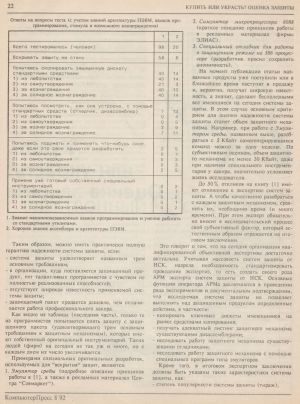
The choice of the NSC protection system for software is always difficult. How to overcome the subjective factor when comparing two or more systems of protection against NSC among themselves? How to evaluate the reliability of protective mechanisms?
This article is devoted to this issue.
Buy or steal? Protection rating
Currently, software packages aimed at protecting executable modules from the NSC (unauthorized copying) and unauthorized access (unauthorized access) appear like mushrooms after rain. If at the beginning of the summer of 1991 we were able to catch about 20 protection systems [1] in the muddy streams of unauthorized copies, today this number has at least tripled. They are written by almost everyone who knows how to count a checksum, knows the EXE file structure and has a lot of free time. The cost of protection systems is the most diverse - from 100 rubles to 30 thousand rubles. The quality of workmanship and the possibilities are also very different and are practically unrelated to the price of the package. Therefore, it is sometimes quite difficult for an inexperienced user to make the right choice on the market for such products.
The purpose of this article is to develop an approach to the examination of NSC protection systems.
The first step in conducting research was aimed at studying the hackers' work methods and just lovers of “undressing” protected programs for their own satisfaction. To begin with, 118 programmers with different professional skills and representing different institutions were tested for their interaction with a protected package. Answers of respondents to the test questions are given in the table below.
Interestingly, such an incentive as self-assertion is not much less than a monetary reward, especially in the conditions of our specific market. This is understandable, because one of the indicators of the developer’s professionalism is the presence of independently obtained listings of well-known protection mechanisms, for example, the COPYLOCK package. Therefore, one of the important characteristics of the protection system is its popularity. Nobody will be engaged in research of a little-known protection system for the sake of self-assertion.
The test results show that 98% of programmers will not try to overcome the protective mechanism if the protection system of the executable module guarantees:
- the impossibility of copying a key diskette by means of copying widely known and available to virtually every developer, such as the COPY II — PC, COPYWRITE, UNLOCK complex;
- the impossibility of researching a software product using well-known debuggers, disassemblers,
Thus, it is possible to have an almost complete guarantee of the reliability of the protection system if:
- the protection system meets these three basic requirements;
- there are no talented programmers in the organization where the protected product is delivered with a feeling of incompletely realized abilities;
- there is no widespread awareness of the applied protection system;
- The protected package is sold cheaper than the work of a professional hacker.
As can be seen from the table (the last part), only those programmers will try to unprotect a protected package (satisfying the three main requirements for protective mechanisms) that have their own original tools. There are not so many such people (companies) today, but every day their number is increasing.
Examples of special original designs used to “open” the protections are:
- Environment emulator (a detailed description of the principles of work in [1], as well as in the promotional materials of the Center “Sovmarket”).
- Microprocessor simulator 8088 (a brief description of the principles of work in promotional materials company ELIAS).
- Special debugger to work in protected mode on the 386 processor (the developer asked to preserve anonymity).
At the time of publication of the article, the named products have already arrived, or will soon be on sale, and are likely to be widely known, which means they will render all the current protection systems useless. In this case, the main criterion for assessing the reliability of the protection system will be the volume of the protective mechanism. For example, when working with the Environment Emulator , mentioned above, it is possible to deal with 5 Kbytes of self-generated commands in one week. According to subjective estimates, the volume of the defense mechanism of at least 30 Kbytes, even with special tools from a hacker, greatly complicates the life of the researcher.
Up to 50% of the responses to the book [1] are related to the examination of protection systems. And in order to properly deal with each protective mechanism, to compare them, time is needed (and a lot of time). At the same time, the expert necessarily introduces his subjective factor into the research process, which naturally reflects on the final conclusion.
This suggests that today the organization of a qualified objective examination is quite relevant. Considering the massive nature of protection systems from the NSC, there is a need to standardize the examination, that is, to create a kind of AWS of an expert of the protection systems from the NSC. The main functions of the operator's automated workplace are to conduct a series of experiments and documentary evidence that the security system under investigation does not allow certain actions to be performed on the protected product, in particular:
- copy key diskettes with commercially available copy tools;
- get an adequate listing of the protective mechanism of existing disassemblers;
- explore the work of the defense mechanism with existing debuggers;
- to investigate the work of the protective mechanism with the help of special programs such as emulators.
...
The rest of the article is devoted to the methodology of comparing protection systems from NSC, and I have omitted it.
Answers to test questions (taking into account knowledge of PC architecture, programming languages, stimulus and possible reward)
| one | 2 | |
| Total tested (person) | 98 | 20 |
| I will not open the defense | 58 | 6 |
| I will try to copy a protected floppy by standard means. | 40 | 14 |
| 1) out of curiosity | 40 | 14 |
| 2) of self-affirmation | 21 | 3 |
| 3) for a fee | 40 | 13 |
| 4) for a solid reward | 40 | 14 |
| I will try to see how it works, using standard tools (debugger, disassembler) | 7 | 13 |
| 1) out of curiosity | 0 | four |
| 2) of self-affirmation | 0 | five |
| 3) for a fee | 3 | 9 |
| 4) for a solid reward | 7 | eleven |
| I will try to think and apply something of my own, even if I have to develop my own | 2 | five |
| 1) out of curiosity | 0 | one |
| 2) of self-affirmation | 0 | 3 |
| 3) for a fee | 0 | 3 |
| 4) for a solid reward | 2 | five |
| I will apply already ready own special toolkit | 0 | 2 |
| 1) out of curiosity | 0 | one |
| 2) of self-affirmation | 0 | 2 |
| 3) for a fee | 0 | one |
| 4) for a solid reward | 0 | 2 |
2. Good knowledge of assembler and PC architecture.
In other words, the more professional a programmer is, the more willing he is to break into copy protection - although it would seem, who can treat it with more respect than professional programmers, whose well-being directly depends on the inviolability of copy protection?
But fast forward to five years. The last article I want to share today relates to the “topic of the number” of Computerra for August 1997 - the development of global and local networks made the “thin client” architecture and Software-as-a-Service model relevant and promising, will deliver a crushing blow to piracy.

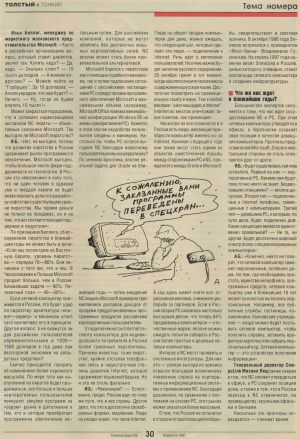
... Barrier # 1 - illegal distribution of programs, where you can save as much as no NC. In Russia, the laws of the global software market are true only in relation to a small part of it, primarily to corporate users who value their reputation. It's no secret that the pirates are outraged in the PC software market, thanks to which Russian users are deprived of the problems of their Western colleagues, who have to spend a lot of money on the next upgrade.
Ilya Billig, marketing manager of the Moscow office of Microsoft: “Often in Russian organizations the question that the director puts is: should I buy? - Yes, it is necessary. - How much is? - 10 thousand dollars. - Can we do it differently? - We can go to the "crust". For 10 dollars. - And if we steal, what will we have? - Nothing.“Well, then we won’t pay 10 thousand!” The
suspicion may creep in that in the conditions of the imminent expansion of NC, pirates are objective allies of Microsoft. So is Microsoft piracy profitable?
IB: “No, it is not profitable, because the development of piracy in Russia is holding back the software market. Microsoft is beneficial for a large number of firms to support its technology. In Russia, this is impossible due to the fact that not a single person in his right mind and hard memory will invest in software development with the current level of piracy. We are losing money not only on sales, but also on the fact that there is no corresponding support in the industry. ”
According to Billig, the eradication of piracy in the coming years is out of the question: “If we look at Eastern Europe, the level of piracy is about 70-80%. They started with the same thing as us. Microsoft sells more in Czechoslovakia and Poland than in Russia. The immediate task is 80%. The five-year plan is 40-50%. ”
If the network computer takes root in Russia, it will be a blow to piracy: the client-server architecture and the smart card mechanism exclude it in principle. Another question: wouldn’t the Russian users prove to be burdensome and $ 1000–1500 a year even with undoubted savings on hardware?
Now we have to talk about changes of a more modest scale. As the attack on pirates continues, more and more corporate users will stop buying programs on the gray market in addition to those who are still acquiring software legally. For Russian companies that cannot do without powerful enough corporate networks, NC may well become a more attractive alternative.
Microsoft is struggling with piracy both through a judicial mechanism, and by signing agreements with Russian PC suppliers on pre-installing Microsoft software to the maximum extent (for example, Microsoft Office in addition to the minimum configuration of Windows 95 on a newly acquired PC). It seems that in this case user inconvenience is minimized. So much so that the PC remains more profitable NC due to the well-known user conservatism? According to Bryuzgin, the real challenge for Oracle in the coming years is to deprive Microsoft of about $ 3 million in revenues from the sale of pre-installed software products to Russian corporate users by implementing NC.
A networked computer connected to the Internet for an individual consumer in Russia has more vague prospects. The reasons are known: the same piracy, extremely backward telephone communication and the insufficient degree of development of the Internet, which holds back the language barrier. But this is not so fatal.
I.B."Revolution? - Naturally, coming. Russia follows the same path as all countries. Another thing is that it is in rather peculiar forms, slower. People on the streets know what the Internet is. Looking at the sales of computers for the home, we can expect that the next step that these people will take is connecting to the Internet. We are talking about millions of users. But the presence of Russian content will be very important. October 25 will break out at a time when a critical mass of content in Russian has accumulated. Just look at the provincial newspaper in the world. There in any advertisement: “and here is our address on the Internet”. The Internet is largely destroying such a thing as a province. ”
Despite all the difficulties, there are people in Russia who want to buy a computer because of the Internet. Starting next year, they can also become one of the objects of fierce struggle between PC and NC supporters, primarily between Oracle and Microsoft. Everything can be used here: aggressive advertising, price cuts, the struggle for partners. If in Russia PC assembly turned out to be so profitable that now 64% of the computers sold are domestic brands, then we can well expect attempts to assemble simpler and cheaper network computers in Russia.
Interest in NC can be shown by system integrators. For them, this is a reserve to overcome the crisis in the industry due to the possible emergence of demand for corporate information systems using NC. Due to its low cost, compared to PC-based systems, this market may turn out to be more massive.
The secular chronicle also shows that Russia will not remain aloof from the growing struggle. In October 1996, Allison met with the President of Most Bank Vladimir Gusinsky. Ellison’s visit to Russia is scheduled for April 1997, the purpose of which will obviously be the promotion of a network computer and the creation of infrastructure.
What awaits us in the coming years?
Most experts are inclined to believe that the coexistence of NC and PC is waiting for us. In this case, network computers will be established in offices, and personal computers will retain their positions as home computers. The forecasts of representatives of Microsoft, Oracle and the neutral side are not so different from each other:
IB: “There will be three types of devices. The first one is corporate PC. What they will be, while nobody knows for sure. Diskless stations? - I fully admit. The second type is Internet-connected telephones combined with computers. The third type is home PC, to which, in fact, the house will be connected. Which concept is the only correct one? - Neither one nor the other. There will be a fairly wide range of more specialized computers. ”
A. B .:“Of course, no one says that the network computer will replace the personal one, especially at home. But where simplicity, unity of the interface, software are necessary, the network computer already in the next 10 years can completely force out the personal ones. For example, all public services: hotels, clinics, banking institutions - everywhere you can put a network computer to get help, insert a credit card or dial a personal code. A network computer is a device for receiving information. ”
CompuLink CEO Mikhail Lyash is also confident that NC will be able to establish itself in the office, and the PC will retain its position at home, and also that in Russia, the transition to NC will be limited mainly by large offices and banks.
How these predictions come true - time will tell.
Source: https://habr.com/ru/post/177275/
All Articles